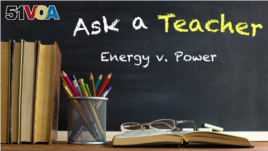16 September 2022
Hello! This week on Ask a Teacher, we will answer a question from Max in Ukraine about the difference between "energy" and "power."
Question:
Dear Learning English,

Ask a Teacher: Energy v. Power
I'm Max from Ukraine.
I'm improving my English by listening & viewing materials in VOA.
I have a question about the difference in the meaning of two similar words - energy and power.
Thank you,
Max
Answer:
Dear Max,
Thank you for this interesting question. These words are commonly used interchangeably, meaning they are used in place of each other.
But there are important differences in use under some conditions.
Let's start with how these two words differ in the study of science.
"Energy" and "power" in science
Energy is the ability to do work or create some kind of physical change.
For example,
Energy is used to lift a box.
The amount of energy to lift the box is the same. But what if you can lift the box faster than someone else? This is where the word "power" comes in.
Power is how fast the work or change is done. In the field of physics, power is often measured in watts.
An energy-saving light bulb will use about 10 to 15 watts of power.
"Energy" in everyday conversation
Energy as a noun can describe the ability to do physical activities; it can be the feeling of life and enthusiasm that you use to complete tasks.
If you have low or no energy, you may feel tired or run down.
Energy can be temporary. You may have a lot of energy in the morning, but by the afternoon you may not have any energy.
Coffee gives me energy, but it quickly wears off.
"Power" in everyday conversation
Power as a noun can mean the ability or capacity to do something. It can also mean that it is within your means or you have the resources to do something. This meaning has an association that power is naturally available.
I don't have the brain power to finish my homework tonight.
To have power means that you have control over something. If you have power, you have the ability and legal right to do something.
To "come into power" or "take power" in a country means that a person or group controls it in some way.
King Charles III took on the powers of the British monarchy after his mother, Queen Elizabeth II died.
We can also use "power" to talk about energy resources like nuclear and electricity.
Nuclear power is environmentally friendly.
Power can also be a verb meaning to provide energy to make something operate.
Batteries power our smart devices like cell phones.
Please let us know if these examples have helped you, Max!
What question do you have about American English? Send us an email at learningenglish@voanews.com
And that's Ask a Teacher.
I'm Faith Pirlo.
Faith Pirlo wrote this lesson for VOA Learning English.
_________________________________________________________________
Words in This Story
watt – n. a unit for measuring power
light bulb – n. a glass bulb or tube that produces light when it is supplied with electricity
enthusiasm – n. strong excitement about something
capacity – n. the largest amount or number that can be held or contained